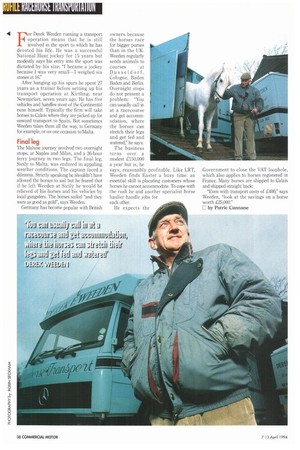A or Derek Weeden running a transport
Page 40

If you've noticed an error in this article please click here to report it so we can fix it.
F
operation means that he is still involved in the sport to which he has devoted his life. He was a successful National Hunt jockey for 15 years but modestly says his entry into the sport was dictated by his size: "I became a jockey because I was very small—I weighed six stones at 16."
After hanging up his spurs he spent 27 years as a trainer before setting up his transport operation at Kirtling, near Newmarket, seven years ago. He has five vehicles and handles most of the Continental runs himself. Typically the firm will take horses to Calais where they are picked up for onward transport to Spain. But sometimes Weeden takes them all the way, to Germany for example, or on one occasion to Malta.
Final leg
The Maltese journey involved two overnight stops, at Naples and Milan, and a 26-hour ferry journey in two legs. The final leg, Sicily to Malta, was endured in appaling weather conditions. The captain faced a dilemma. Strictly speaking he shouldn't have allowed the horses to sail but he feared that if he left Weeden at Sicily he would be relieved of his horses and his vehicles by local gangsters. The horses sailed "and they were as goad as gold", says Weeden.
Germany has become popular with British owners because the horses race for bigger purses than in the UK. Weeden regularly sends animals to courses at Dusseldorf, Cologne, Baden Baden and Berlin. Overnight stops do not present a problem: "You can usually call in at a racecourse and get accomm. °dation, where the horses can stretch their legs and get fed and watered," he says.
The business turns over a modest £150,000 a year but is, he says, reasonably profitable. Like LRT, Weeden finds Easter a busy time: an essential skill is placating customers whose horses he cannot accommodate. To cope with the rush he and another specialist horse haulier handle jobs for each other.
He expects the Government to close the VAT loophole, which also applies to horses registered in France. Many horses are shipped to Calais and shipped straight back: "Even with transport costs of ..C400," says Weeden, "look at the savings on a horse worth 125,000."
C by Patric Cunnane


















































































